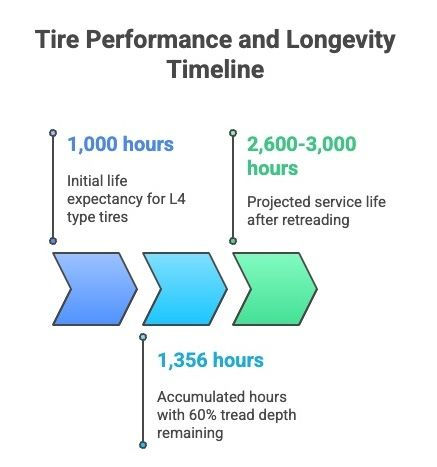Downsides to a Solid or a Semi-Solid Skid Steer Tire
- Galileo Wheel

- Aug 9, 2024
- 4 min read
Updated: Apr 24, 2025

Tires must be durable and perform well in industries that rely heavily on skid steer loaders, such as construction, agriculture, and landscaping.
No-flat skid steer tire have emerged as a popular alternative to traditional pneumatic tires due to their resistance to flats and promise of reduced downtime.
However, like any technology, they come with their own set of challenges and considerations.
What Are Solid and Semi-Solid Skid Steer Tires?
No-flat skid steer tires are designed to eliminate the risk of flats using solid or semi-solid materials instead of relying on air pressure to maintain their shape.
These tires are typically made from a combination of rubber compounds and other materials that provide durability and shock absorption. The design aims to offer the benefits of pneumatic tires – such as cushioning and traction – while removing the vulnerabilities associated with air-filled tires.
These tires are particularly popular in environments where debris, sharp objects, and rough terrain are common (like agriculture), as they offer a solution that reduces the need for frequent tire repairs and replacements.
Downsides of Conventional No-Flat (Solid) Skid Steer Tires
While these tires offer significant advantages, there are also no-flat skid steer tire downsides that potential users should consider:
Stiff Ride
One of the primary disadvantages of conventional no-flat skid steer tires is the potential for a stiffer ride compared to pneumatic tires.
Due to the lack of the natural cushioning provided by air, these tires may transmit more vibrations and shocks to the machine and operator, potentially leading to more wear and tear and discomfort for the operator.
Reduced Traction
The solid construction of no-flat tires can sometimes result in reduced traction, especially in wet or uneven conditions.
The lack of air pressure means these tires cannot adapt to surface irregularities as effectively as pneumatic tires, potentially leading to a decrease in maneuverability and control in challenging environments.
Increased Weight
No-flat skid steer tires are generally heavier than their pneumatic counterparts due to their solid construction.
This increased weight can affect the overall performance and fuel efficiency of the skid steer loader, potentially leading to higher operating costs over time.
Higher Initial Cost
The initial cost of no-flat skid steer tires is generally higher than that of pneumatic tires. While they offer long-term savings through reduced downtime and maintenance, the upfront investment can be a barrier for some operators, especially those managing tight budgets.
Heat Buildup
The solid design of no-flat tires can lead to heat buildup during operation, particularly in high-speed or heavy-load applications. Excessive heat can cause premature wear and potentially compromise the tire’s integrity, reducing lifespan.
Limited Customization
Pneumatic tires offer various customization options, including varying tread patterns and air pressure adjustments to suit specific tasks and conditions.
Being solid, no-flat tires have limited customization flexibility, which may restrict their suitability for certain applications.
Galileo Wheel’s Airless Skid Steer Tires: Superior Performance
Galileo Wheel’s no-flat skid steer tires, SkidCup, address many downsides associated with conventional options, providing operators with a more effective solution. Here’s what makes Galileo Wheel’s tires stand out:
Innovative Design
Galileo Wheel’s no-flat skid steer tires feature a unique design combining durability and performance.
Their proprietary CupWheel technology integrates a flexible structure within the tire and concave side walls that create an air pocket, offering improved shock absorption and a smoother ride compared to traditional solid tires.
This innovation helps reduce operator fatigue and equipment stress, enhancing overall productivity.
Enhanced Traction
The advanced tread pattern of Galileo Wheel’s tires is designed to offer superior traction and stability in various conditions.
This ensures better control and maneuverability on challenging surfaces, minimizing the risk of slippage and improving safety on the job site.
Optimized Weight
Galileo Wheel has managed to reduce the weight of its no-flat tires without compromising strength or durability.
This optimization helps maintain the skid steer loader’s performance and fuel efficiency, providing a balanced solution that addresses one of the key drawbacks of conventional no-flat tires.
Extended Lifespan
Thanks to their robust construction and innovative materials, Galileo Wheel’s no-flat tires offer an extended lifespan compared to many conventional options.
This longevity translates to fewer replacements and lower long-term costs, making them a cost-effective choice for operators looking to maximize their investment.
Heat Dissipation
Galileo Wheel tires incorporate heat dissipation technology, reducing the risk of heat buildup during operation.
This feature enhances the tire’s durability and performance, ensuring reliable use even in demanding conditions.
Versatile Applications
While conventional no-flat tires may be limited in specific applications, Galileo Wheel’s tires are engineered to be versatile and adaptable to a wide range of environments and tasks.
Their adaptability makes them a practical choice for operators seeking a reliable tire solution across various industries.
No-Flat Skid Steer Tires Without the Drawbacks
Galileo Wheel’s no-flat skid steer tires offer a compelling solution for operators seeking durability, performance, and efficiency.
They reduce downtime, improve comfort, and save on long-term maintenance costs. They’re also safe and stable, reduce environmental waste, and mitigate the most common downsides associated with similar types of tires.
Contact Galileo Wheel today to get started.




Comments